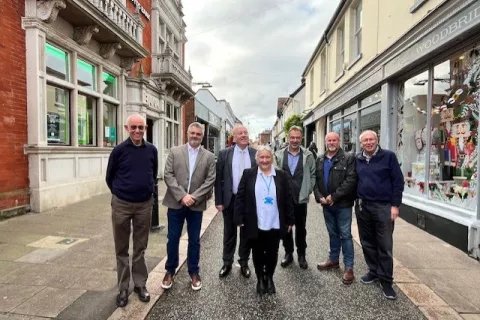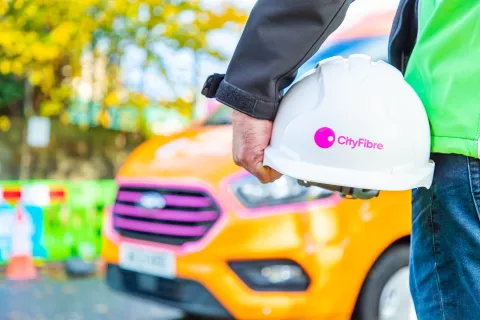
Project Gigabit
First 'Project Gigabit' customers in Suffolk connect to CityFibre's full fibre network
12 December 2024
 Paul Heritage-Redpath, Product Manager[/caption]
The foundation of their campaign is as follows:
1. Give customers written speed estimates at the start of the contract.
2. Allow people to exit contracts without penalty if they don’t get that speed.
3. Fix loss of connection as quickly as possible and refund people for loss of service.
4. Cut out the jargon – give consumers information they understand and take responsibility for fixing problems.
To encompass these demands Richard Lloyd, executive director at ‘Which?’ stated “We want broadband providers to give you written speed estimates at the start of your contract, and to let you exit that contract without penalty if they fail to meet those speeds.”
Any ISP can do that. Traditional broadband - the sort that doesn't have a cabinet in the middle, will provide download speeds of less than 24Mbps and more than zero. Or didn’t Richard Lloyd mean "estimate" - as in the dictionary definition of "general idea". Maybe he meant “quotation”?
In that case, surely he’d be happy with using a DSL checker and entering your phone number? That’s more accurate. Still not good enough? It seems he wants a set figure, below which one can claim a refund. In other words, he doesn't want an estimate, he wants a speed guarantee. Well, we’ve got news for you and it’s all bad.
The “speed” a user gets can be affected by so many different variances. For instance, the length of their line, how many users share the line, using wireless equipment, the user’s computer, the load on a server and not forgetting the weather – because the conductivity of copper (unless of course you are unlucky enough to have aluminium wiring) varies when it is exposed to water.
Anyone can have a line with a guaranteed speed on it today. It involves laying fibre, a technology which uses light, something which has negligible deterioration with distance and which is not affected by weather. Digging holes for it costs much more than consumers are willing or able to pay though, which is why only businesses currently enjoy guaranteed speeds. Broadband products are in their very nature contended services, shared by others to keep the cost low.
Which? also forgets that, in Ofcom surveys, the UK has been found to be neither the best nor worst in Europe for broadband, but because many providers cross-subsidise using the cost of the required telephone line, by golly our broadband is at least cheap. So cheap that O2 pulled out of the market, TalkTalk are putting their prices up, and BT, Virgin and Sky now cross-subsidise with media packages.
Ofcom: Survey of broadband in Europe
Let’s not also forget that most ISPs already practice fair usage by keeping customers well informed and attempt to give as accurate an estimate as possible. The Voluntary Code of Practice for Broadband Speeds that Ofcom are currently revising already requires ISPs to adhere to particular standards in order to ensure fair usage.
Entanet has held or reduced prices and still offers monthly contracts on the majority of its packages. But if this campaign succeeded and we were forced to allow everyone to leave at will, no sane business would or could bear the cost of the activation and cease fees we pay the incumbent infrastructure provider for supplying broadband. So the price of a broadband package upfront would go up by something in the region of £75 to cover those costs. This is probably not the result Which? intended, we’re guessing?
Let's look at Which?'s other issue with broadband. When it goes wrong, it takes too long to fix. In many cases that is also true. To our enormous frustration, there is a defined limit to what ISPs can do about that. If Which? wants to pursue higher standards in repair they, as Ofcom recently did, need to take it up with Openreach.
ISPreview: Ofcom UK propose faster line repairs and installations
Every ISP - large and small, even the LLU operators, have to deal with Openreach at some point to have repairs done. Openreach are the engineering arm of BT. They employ very dedicated engineers around the country. But engineering organisations aren't naturals at customer service skills and, as a virtual monopoly looking after that last section of copper, there is no great incentive for them to improve. So ISPs can only cross their fingers and send someone else’s engineer, who may or may not fix the problem first time.
We understand the vital importance of connectivity for businesses and consumers to thrive in this country. Broadband should be as important a part of our national infrastructure as roads. But please, Which?, take a leaf from Stephen Covey and "Seek First to Understand, Then to Be Understood". ISPs make the best of the infrastructure we have by providing a human interface between the public and Openreach. But by focussing on the middleman not the provider in this chain, you run the risk of looking like Basil Fawlty, thrashing his car because it won't go where he wants it to.
Have your say!
Do you feel that this is an issue for ISPs or Openreach? Do you think a broadband speed guarantee is possible? Let us know your thoughts below!
Related Articles
Paul Heritage-Redpath, Product Manager[/caption]
The foundation of their campaign is as follows:
1. Give customers written speed estimates at the start of the contract.
2. Allow people to exit contracts without penalty if they don’t get that speed.
3. Fix loss of connection as quickly as possible and refund people for loss of service.
4. Cut out the jargon – give consumers information they understand and take responsibility for fixing problems.
To encompass these demands Richard Lloyd, executive director at ‘Which?’ stated “We want broadband providers to give you written speed estimates at the start of your contract, and to let you exit that contract without penalty if they fail to meet those speeds.”
Any ISP can do that. Traditional broadband - the sort that doesn't have a cabinet in the middle, will provide download speeds of less than 24Mbps and more than zero. Or didn’t Richard Lloyd mean "estimate" - as in the dictionary definition of "general idea". Maybe he meant “quotation”?
In that case, surely he’d be happy with using a DSL checker and entering your phone number? That’s more accurate. Still not good enough? It seems he wants a set figure, below which one can claim a refund. In other words, he doesn't want an estimate, he wants a speed guarantee. Well, we’ve got news for you and it’s all bad.
The “speed” a user gets can be affected by so many different variances. For instance, the length of their line, how many users share the line, using wireless equipment, the user’s computer, the load on a server and not forgetting the weather – because the conductivity of copper (unless of course you are unlucky enough to have aluminium wiring) varies when it is exposed to water.
Anyone can have a line with a guaranteed speed on it today. It involves laying fibre, a technology which uses light, something which has negligible deterioration with distance and which is not affected by weather. Digging holes for it costs much more than consumers are willing or able to pay though, which is why only businesses currently enjoy guaranteed speeds. Broadband products are in their very nature contended services, shared by others to keep the cost low.
Which? also forgets that, in Ofcom surveys, the UK has been found to be neither the best nor worst in Europe for broadband, but because many providers cross-subsidise using the cost of the required telephone line, by golly our broadband is at least cheap. So cheap that O2 pulled out of the market, TalkTalk are putting their prices up, and BT, Virgin and Sky now cross-subsidise with media packages.
Ofcom: Survey of broadband in Europe
Let’s not also forget that most ISPs already practice fair usage by keeping customers well informed and attempt to give as accurate an estimate as possible. The Voluntary Code of Practice for Broadband Speeds that Ofcom are currently revising already requires ISPs to adhere to particular standards in order to ensure fair usage.
Entanet has held or reduced prices and still offers monthly contracts on the majority of its packages. But if this campaign succeeded and we were forced to allow everyone to leave at will, no sane business would or could bear the cost of the activation and cease fees we pay the incumbent infrastructure provider for supplying broadband. So the price of a broadband package upfront would go up by something in the region of £75 to cover those costs. This is probably not the result Which? intended, we’re guessing?
Let's look at Which?'s other issue with broadband. When it goes wrong, it takes too long to fix. In many cases that is also true. To our enormous frustration, there is a defined limit to what ISPs can do about that. If Which? wants to pursue higher standards in repair they, as Ofcom recently did, need to take it up with Openreach.
ISPreview: Ofcom UK propose faster line repairs and installations
Every ISP - large and small, even the LLU operators, have to deal with Openreach at some point to have repairs done. Openreach are the engineering arm of BT. They employ very dedicated engineers around the country. But engineering organisations aren't naturals at customer service skills and, as a virtual monopoly looking after that last section of copper, there is no great incentive for them to improve. So ISPs can only cross their fingers and send someone else’s engineer, who may or may not fix the problem first time.
We understand the vital importance of connectivity for businesses and consumers to thrive in this country. Broadband should be as important a part of our national infrastructure as roads. But please, Which?, take a leaf from Stephen Covey and "Seek First to Understand, Then to Be Understood". ISPs make the best of the infrastructure we have by providing a human interface between the public and Openreach. But by focussing on the middleman not the provider in this chain, you run the risk of looking like Basil Fawlty, thrashing his car because it won't go where he wants it to.
Have your say!
Do you feel that this is an issue for ISPs or Openreach? Do you think a broadband speed guarantee is possible? Let us know your thoughts below!
Related Articles
With network projects in over 60 cities and construction underway to reach up to 8 million homes

Project Gigabit
12 December 2024

City communications
3 December 2024

Corporate news
1 November 2024